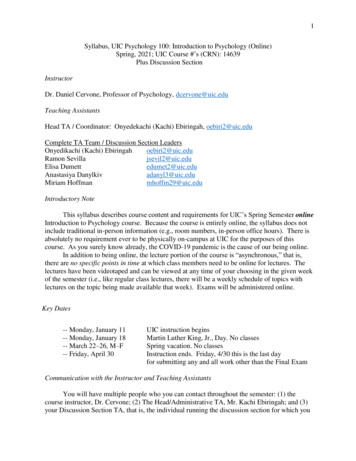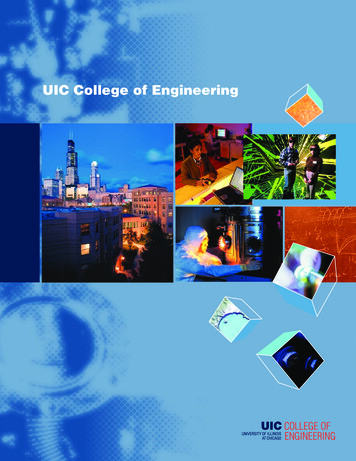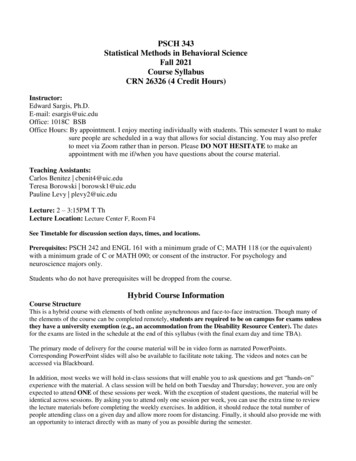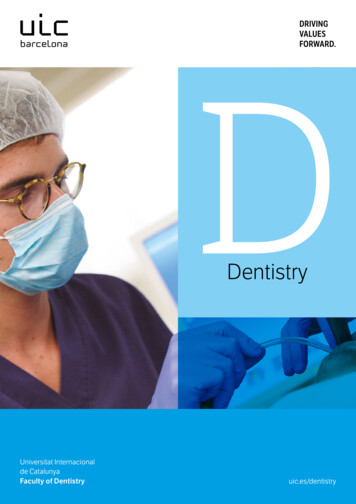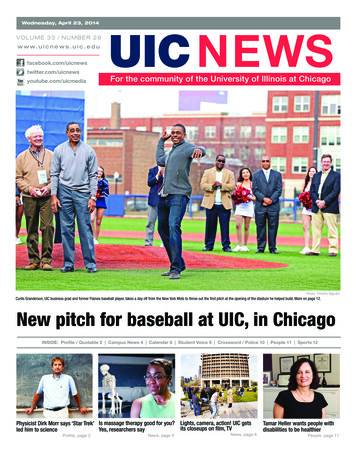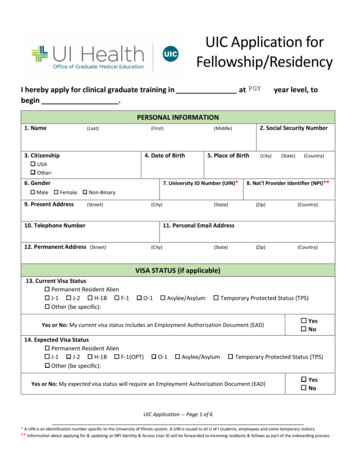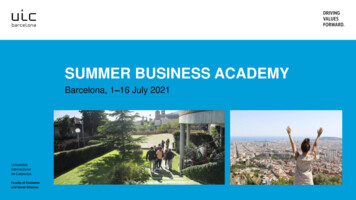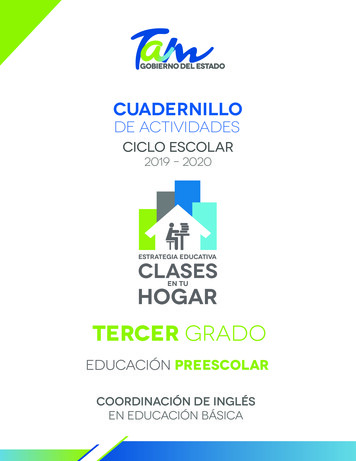
Transcription
UICACTIVITYREPORT2020-2021
UICACTIVITYREPORT2020-2021
FOREWORD BYKRZYSZTOF MAMIŃSKI,UIC CHAIRMANDuring 2020 and 2021, UIC encountered severalimportant and difficult challenges due to thecrisis caused by the Covid-19 pandemic. Despitethese, UIC has demonstrated its ability to conductjoint projects and effective activities and eventscompetently and comprehensively in the areas oftransport, innovation, and environmental protection.Of all transport modes, the railway sector has bestdemonstrated its resilience to the crisis, ensuringfull mobility for passengers and goods globally. Therailways have confirmed that they can guarantee,even in exceptional circumstances, the rapidtransport of passengers, as part of their publicmission, and essential commodities such as food,medicine and fuel. The actions taken by UIC in 2020in relation to the pandemic deserve special attention.UIC launched the Covid-19 Task Force to ensurethe regular exchange of information between UICmembers and partner organisations and to developresponses to the crisis in the transport sector.Among the conclusions drawn, the high resistanceof railways and their significant role in achieving thesustainable development of the world economyshould be particularly noted. I am fully convincedthat the railways will play an important role in the4process of sustainable post-pandemic recoveryand economic recovery. Nevertheless, the railwaysstill need a lot of investment and development inthe area of digitisation, innovation and commonstandardised solutions to daily operational needs.All these activities have a direct impact on thecompetitiveness and position of railways in theglobal economy.As UIC Chair, I made a commitment to work withour members in Europe and beyond to ensurethat railways play an important role in achievingspecific climate and environmental goals globally.The pan-regional development of the railways isequally important to me because it is importantfor society as a whole and, above all, for our planet.“THE RAILWAY SECTORHAS DEMONSTRATED ITSRESILIENCE TO THE CRISIS,ENSURING FULL MOBILITYFOR PASSENGERS ANDGOODS GLOBALLY.”
Foreword by Krzysztof Mamiński, UIC ChairmanThe railways, as an environmentally friendly meansof transport, are a basic instrument in the fightagainst negative climate change.At this point, it is also necessary to emphasisethe activities carried out by UIC in 2021 in thefield of sustainable transport and the success ofits participation, on behalf of the global railwaycommunity, in COP26. I am convinced that therailway voice will be even more audible in futureclimate summits.We also know that railways need a vision: a realvision supported by instruments for its effectiveand efficient implementation. The documententitled 2030 Vision – Design a Better Futureprepared by UIC is such a document, but it isalso ambitious in its content. UIC calls on, andwill appeal to, representatives of political, socialand economic organisations to ensure that suchambitions in the field of support to the railwayscan be achieved on a global level.I consider the participation of UIC in the events ofthe European Year of Rail or the organisation ofthe UIC International Symposium, which began theUIC centenary celebrations, as highly significant.Based on these events, we can see that therailways are attracting more attention and supportfrom international partners. The conclusions of theUIC Symposium indicate that there is a need tocontinue to engage in the creation of a coherentrailway network, railway corridors and a moveaway from the patchwork system.The basic needs of the members of each UIC regionin developing interregional cooperation remaina priority for me. UIC is the optimal platform forsharing ideas and best practices within the globalrailway community.As UIC Chair, I would like to draw from, inter alia,the experiences of our members, but also from theexperience of my work as the President and CEO ofPKP – Polish State Railways for which I have beenworking for 41 years. I see further potential in terms ofgreater involvement of UIC on the international scene.UIC has been guided by certain values andprinciples for many years. Nowadays, the valuesof Unity, Solidarity and Universality are of keyimportance for UIC, especially in the face ofsupport for railways that suffer damage caused bythe military actions of other countries. We mustbe united and in solidarity as a sector.Railways must play a leading and key role in thedevelopment of the global transport sector. Ourgoal is to further promote the advantages of railand to make it more attractive to all decisionmakers. We want more people to travel by train,more companies to transport their goods on therailways, and more people to consider a career ina vibrant global railway sector. We also want toshow the potential of railways to compete withother modes of transport. There is a lot of workahead of us before we can collectively reach thefull potential that railways offer, and will continueto offer, to end users.On this occasion, I would also like to thank mypredecessor, Gianluigi Castelli, for his efficient andeffective leadership of the organisation. I wouldalso like to thank all of the UIC team, headed byDirector General François Davenne, for their hardand effective work in the development of UIC.This year is the 100th anniversary of ourorganisation. On this occasion, I wish you allpeace, health, achievement of goals and furtherdevelopment of our joint UIC organisation.5
FOREWORD BYFRANÇOIS DAVENNE,UIC DIRECTOR-GENERALThe Covid-19 crisis we experienced in 2020 and2021 impacted all of our members, but our sectorproved itself extremely resilient and, thanks to ourcollective commitment, essential goods continuedto be transported and vital travel between urbancentres was maintained. During this challengingperiod, UIC made a conscious effort to ensure itwas working in the fundamental interests of itsmembers. I would like to thank each and every oneof them for their loyalty and their involvement inour organisation’s work.The UIC teams were delighted to see that theirprojects remained of interest, and even increasedin volume and quality as we entered into the UIC2020-2022 Work programme. This demonstratesthat UIC’s constant readiness to listen to all ofits members ensured their strong bond wasmaintained – as shown by the significant growthof your overall satisfaction which went from 65%to 75%.In this activity report covering two years, I havetaken care to show that the commitments madein our work programme have served to guide us.6I am very proud to tell you that we have madeexcellent progress in its implementation, which isorganised around five strategic priorities:f Promoting rail transport on a global scale: acommon and inspiring vision for 2030 “designa better future” has been formulated andsupported by all our members. Its presentationat COP27 was a huge success and we areworking on a complementary work programme“manifesto” for its implementation.f Continuing to develop UIC as a technicalplatform tailored to our members’ needs: over 9.5 M has been spent on projects since 2019,which represents a total increase of morethan 15% compared to 2019. In addition, theadoption of new remote working technologieshas actually proved beneficial for interregionaltechnical cooperation: the regional chairs nowmeet at least three times each year.f Creating innovation through projects: UICis working as part of the Europe’s Rail JointUndertaking (ER JU) European researchprogramme.
Foreword by François Davenne, UIC Director-General“THIS DECADE, WHICH WILL SEE THE 100-YEARSANNIVERSARY OF UIC IN 2022, WILL BE CRUCIALFOR THE FUTURE OF OUR PLANET.”Developments key to our sector, such asFRMCS (rail 5G) and OSDM (an internationaland multimodal ticketing platform), ensurethat our association is indispensable.which consists of Krzysztof Mamiński, CEO ofPKP, as the new Chair and Mohamed Khlie, CEO ofONCF, as Vice-Chair. Their nomination in July 2021was unanimously supported.f Promoting decarbonised transport: all studiesshow that we have 10 years to radically reduceour transport-related emissions: a massivemodal shift to rail is necessary. For this tohappen, we need to change mindsets andassociate rail with new words like ‘flexibility’,‘comfort’ and ‘freedom’. UIC is working toprovide concrete means of achieving this.Krzysztof Mamiński’s tenure will enable theinterregional vision strongly driven in 2020 and2021 to be amplified. Poland’s unique position atthe intersection of corridors from Asia and Europewill inspire innovative collaborations. For the firsttime in its history, UIC will have a Vice-Chair fromthe African region with Mohamed Khlie, DirectorGeneral of Moroccan State Railways. This is apowerful symbol to show that the developmentof rail transport infrastructure in Africa, one ofthe priorities of the African Union, is also of theutmost importance to UIC.f Effective and transparent management for thebenefit of our members: an audit of the supportfunctions has been carried out, which will result ina greater degree of confidence and responsibility.Similarly, we have improved member relationsthrough more frequent bilateral meetings tojointly approve UIC’s strategy.I would like to take this opportunity to commendour Chair Gianluigi Castelli, whose very strongcommitment in 2020 and 2021 has ensured theefficient organisation of our new UIC leadership,This decade, which began in 2021 with theEuropean Year of Rail and will also see the 100year anniversary of UIC in 2022, will be crucial forthe future of our planet. UIC, in its role as a globalassociation of railway companies, is fully mobilisedto provide concrete and effective solutions tomake a massive modal shift towards rail desirable.7
IMPLEMENTATIONSTRATEGIC FOCUS AREASShare, Open, ConnectFurther develop UIC as the technicalplatform to address members’ needsEmbody and convey a system-widevision and technical positionsUp-to-date IRSs in line with stakeholders’ needsProduce specifications/guidelinesLeverage data and sharing of experienceTechnical policies that serve members’ prioritiesMonitor implementation & added value of UIC productsPromote sustainable,carbon-free transportRail as the backbone of mobilityConvey a multimodal vision shared with publictransport and supply-chain stakeholdersDevelop innovative projects forbetter attracting green bondsimplemented8partly implemented0102030405Promote rail transport globallyStrategic positioningThe fundamentals: safety, security, environmentand innovationHighlight and demonstrate the attractiveness ofthe railwaysPartnership with relevant organisations(international and national)Create innovationthrough projectsBecome a world forum for innovative projectsFurther develop a shared innovation strategyPut digital technologies at the centre of the rail systemContribute to accelerating the innovation cycleSupport European and global innovation programmesfor the benefit of the sectorEfficient, transparent managementfor the benefit of our membersEthical and transparent governanceRegular reporting and ongoing assessment ofadded value from activitiesOngoing skills developmentProvide the Regions with a vehicle forproject development
REVIEW OF THE IMPLEMENTATION OF THE STRATEGIC FOCUS AREASRESULTS OF THE IMPLEMENTATION OFSTRATEGIC OBJECTIVESAT THE END OF 2021By the end of 2021, 80% of the objectives related to the strategic focusareas have been achieved.Implementation indicators:action planned in the work programme and implementedaction not planned in the work programme and implementedmore development than expectedaction not implementedMoreover, new priorities have arisen:f Management of Covid-19 crisisf Role of UIC within ERJU (Europe’s Rail Joint Undertaking)f Development of Innovation & Research projects9
UIC MEMBERSAROUND THEWORLD2020-2021 IN FIGURESGOVERNANCE22new UIC Members64statutory meetings and numerouspreparatory meetins per year(at global and regional levels)9forums and platformsper year137technical groups, monitoring9 special groups projectsLes frontières, noms et appellations employés surla carte ne représentent pas une prise de positionofficielle de l’UIC sur le statut juridique des pays outerritoires ou sur le tracé de leurs frontières.The boundaries, names and designations used onthe map do not represent an official UIC position onthe legal status of any country or territory or thedelimitation of its boundaries.March 202210
UIC Members around the worldUIC members11
UIC FACTS & 017members in95 countriesbilliontonne-kilometresCooperation with over100institutions123,000200millionkilometres of linemillionrail personnel70085UIC leaflets - new InternationalRailway Solutions (IRS)congresses,conferences, workshops
UIC governanceUIC GOVERNANCEKrzysztof MamińskiPresident and CEO of Polskie Koleje Państwowe S.A. (PKP)and UIC ChairmanMohamed RabieKhlieDirector General of MoroccanRailways (ONCF), Chair of theUIC African Region andVice-Chair of UICLu DongfuChair of China State RailwayGroup Co., Ltd. (CR) andChair of the UICAsia-Pacific RegionMichel KunzChair of Railway System Forum (SBB-CFF)Laurent SchmittChair of Standardisation Platform (SNCF)Manel Villalante I LlauradóFrancisco Cardoso dos ReisGeneral Secretary of ALAF,Chair of the UIC LatinAmerican RegionChair of Freight Forum (RCG)Finance&DiLegitgaallTe Infoch rmno atlog ioy nBarbara BarrDirector General of TurkishState railways (TCDD),Chair of the UICMiddle-East RegionDirector of InternationalPrograms at the FederalRailroad Administration (FRA)Chair of the UIC NorthAmerican RegionAli CheginiRaChair of Safety Platform (RSSB)ilwaySPiotr KurczChair of Security Platform (PKP S.A.)ysteChristine VanoppenmChair of Sustainability Platform (LINEAS)Chair of Global Passenger Forum (RENFE)Clemens FörstMetin AkbaşJosé Nicanor VillafañeSenior Advisor to the Board& Director InternationalAffairs (IP), Chair ofUIC EuropeMiguel Faro Vianaeisertpx&EChair of Talent & Expertise Development Platform (IP)Vacant positionntiontovaenlInTah&crseaReChair of International RailResearch BoardRailwaySPaFrymenityrcugeSereightChair of Research and InnovationCoordination Group (FSI)tfeaSystessRiccardo SantoroSnaitusylitiab13
CONTENTS4FOREWORD BY KRZYSZTOF MAMIŃSKI, UIC CHAIRMAN6FOREWORD BY FRANÇOIS DAVENNE, UIC DIRECTOR-GENERAL10UIC MEMBERS AROUND THE WORLD12UIC FACTS & FIGURES13UIC GOVERNANCE18UIC IN TIME OF CRISIS: MAIN e work done by the UIC Covid-19 Task ForceStructuring documents for UIC outreachWebinars to disseminate and to stay in touchThe Rail Freight Forward (RFF) initiativeSecurity activities during CovidLaunching the UIC centenary: an international symposium lookingforward to the challenges aheadPROMOTING RAIL GLOBALLYMeeting of the Regional ChairsDevelopment of interregional projectsAfricaAsia-PacificEuropeLatin AmericaMiddle EastNorth AmericaDevelopment of transcontinental corridorsTraining and Human Resources development
UIC governance424344465050505455555760616265PROMOTING SUSTAINABLE CARBON-FREE TRANSPORTModal shift: a new transport paradigmLeverage data and sharing of experienceDevelop innovative projects for better attracting green bondsFURTHER DEVELOPMENT OF UIC AS A TECHNICAL PLATFORMDevelopment of technical specificationsFRMCS and 5G for RailOSDM (Open Sales and Distribution Model)DAC (Digital Automatic Coupling)Combined Transport and General Contract of Use for Wagons (GCU)Specifications and standardisationDevelopment of Acceptable Means of Compliance (AMoC)Creation of the four Station Managers Global Group (SMGG)working groupsSafety and Operations activitiesDIGital IMpacts on business processes (DIGIM II)68RESEARCH AND INNOVATION DRIVING UIC PROJECTS78EFFICIENT AND TRANSPARENT MANAGEMENT687071727374757879System-wide visionInfrastructure challengesArtificial IntelligenceModelling / digital twinsHigh speedResearch and innovation driving UIC projects: FreightSecurity achievements and current European research projectsContingency plan and management controlAn audit in 2020 for a new organisation put in place end of 202115
UIC IN TIME OF CRISIS:MAIN ACHIEVEMENTS
UIC IN TIME OF CRISIS:MAIN ACHIEVEMENTSAt the end of 2019, UIC prepared a comprehensive threeyear programme for the first time. This document, whichwas published at the start of the Covid-19 pandemic inMarch 2020, is a compendium that outlines the mainpriorities, opportunities and focus areas for UIC membersand the sector at large.The period of crisis the world has been through since 2020,and the resilient way in which UIC members have coped withit, shows very encouraging signs for the future. In 2020 and2021, UIC put in place concrete solutions for the benefit of itsmembers, such as the Covid-19 Task Force.UIC technical and safety expertise, the breakthroughinnovative solutions, and the effort towards a global and moresustainable modal shift were listed in this document as thekey factors of UIC organisational change.The work done by the UIC Covid-19 Task ForceFollowing the coronavirus outbreak, UIC launchedthe Covid-19 Task Force on 5 March 2020, bringingtogether UIC member railways, experts and other relevantstakeholders to work together to find ways to respondto the pandemic that were adapted to the railway sector.As a natural forum, UIC was uniquely placed to provide aspace for its members and partner organisations across theworld to share information and benefit from each other’sknowledge and experience.Led by a multidisciplinary internal team, the Task Force wascomposed of 71 UIC member companies and 18 internationalorganisations from all over Europe, the Middle East, Asia,Africa and the Americas. The members came together atonline meetings held at frequent intervals – initially everyfortnight until summer 2020, and then on a monthly basisfrom September onwards.18UIC members and partner organisations provided the TaskForce with relevant information leading to the publication andtranslation into several languages of a number of guidancedocuments and state-of the-art-papers:f Between March and July 2020, five guidance documentswere published and made available online on the dedicatedCovid-19 website. They addressed issues such as mitigationmeasures, rail resilience, restoring customer confidence, service resumption and economic impact analysis.f Between July and December 2020, three state-of the-artpapers were published which focused on measures put inplace by railways such as wearing face masks, ventilation,social distancing, thermographic cameras and contamination rates on trains.All presentations from the meetings were uploaded on to theUIC Extranet in the Covid-19 Task Force workspace availableto members.In addition, during 2020 the UIC Task Force collected,compiled and developed audio-visual material and articles onthis subject, participated in webinars and panels hosted byleading rail industry news providers and event organisers, andlaunched a dedicated LinkedIn group. Short communicationscampaigns were published on UIC’s social media channels,sharing best practice and essential information on travellingby rail during the pandemic. Finally, a short film was producedto present the challenges and work in progress and to explainthe concept of “RAILsilience”: the capacity of the railways tomanage the pandemic and adapt their organisation.All deliverables can be found online:f Dedicated Covid-19 webpage: uic.org/covid-19f Film “How close collaboration across the transport familycan spread best practices and keep mobility chains open:the work done by the UIC Covid-19 Task Force togetherwith UIC members and partners”: bit.ly/2C0YSbZf UIC Multimedia Library: mediacenter.uic.org/enf LinkedIn group: www.linkedin.com/groups/13846065
UIC in time of crisis: main achievementsPUBLICATION OF THESTUDY: MOBILITY POSTCOVID: AN OPPORTUNITYFOR RAILWAYSThe Mobility post-Covid: anopportunity for railways studywas conducted in the first halfof 2021 by Roland Berger onbehalf of UIC in collaborationwith its members. The aimof the study was to revealpredictions for mobility beyondthe post-Covid recovery periodup to 2035 and to providerecommendations for rail sectorstakeholders worldwide.According to predictions,although the long-term impacton transport use and theeconomy remains uncertain,the disruptions resulting fromthe pandemic have created ashort window of opportunityfor the rail transport sector tostrengthen its competitivenessand increase its modal share,provided that new or adaptedstrategies are developed andimplemented without delay.The report highlights thelessons to be learned from thepandemic and sets out thekey objectives that should bepursued proactively by rail sectorstakeholders worldwide in orderto secure and enlarge rail’s scopeof relevance and be able to standout in this new paradigm.The study can be consultedvia this link: for-railways.pdfStructuring documents forUIC outreachTo set up and solidly establish its three-yearstrategy, in 2020 and 2021 UIC publisheda series of strategic documents, including“UIC technical solutions for the operationalrailway”, the UIC Activity Booklet and its2020-2022 Work programme.“UIC technical solutions for theoperational railway”As the main technical body serving not onlyrailway operators, but the entire communityof railway stakeholders, including researchcentres and universities, UIC is a natural forumfor bringing together all stakeholders and fordeveloping collaborative global solutions.“UIC technical solutions for the operationalrailway”, published in 2020 and rangingfrom architecture to financial arrangements,provides an overview of the mainachievements and developments of UIC.Depending on one’s different interests, itgives a synthetic description of operationalsolutions suited to market needs. It is anefficient tool for summarising, in a fewpages, the added value of UIC spreadacross different instruments and workflows:f 700 leaflets describing the entire railwaysystem (with progressive conversion to 300 International Railway Solutions)f Technical Specificationsf Qualitative and quantitative guidelinesf 137 working groups and more than 2,000experts drawn from member companiesf Regularly updated procedures, witha dedicated supervisory platform forstandardisationThe document is available here:uic.org/IMG/pdf/20201126 uic technicalsolutions.pdfUIC Activity Booklet (version 2)Throughout 2020, UIC also worked todevelop a global strategy and, in particular,to enable greater involvement of all theregions in the association’s technicalprojects.Developing multi-regional projects requiresimproved communication and transparency.Hence, the Activity Booklet (version 2)published in 2021 is a first, providing fullmapping of groups with one contact pergroup and a brief explanation of their activity.It maps UIC’s 137 working groups and theexperts involved in the UIC directorates,who work to develop the technical productsused on a daily basis. This document aimsto help members on a day-to-day basis andto contribute to anchoring UIC’s positionas the technical forum of reference for therailway sector. Finally, it has also been veryuseful during this period as a practical toolfor understanding how to cope with thelack of physical meetings.19
UIC 2020-2022 Work programmeWebinars to disseminate and to stay in touchIn early 2020, UIC published its first work programme,endorsed by its members at the last General Assembly inDecember 2019. This strategic document reflects a holisticapproach inspired by the priorities of the sector. Being thetechnical body of the railway operating community, in thisdocument UIC highlights its added value and how it candeliver what is needed for an innovative railway system.In order to keep in touch with its members andstakeholders, UIC rapidly set up a programme of webinarsfrom March 2020 on a variety of themes linked to thestrategic axes of the UIC 2020-2022 Work programme. Morethan 100 webinars were organised by UIC in two years, alltopics combined.The document covers the period 2020 to 2022 and aimsto give a global overview of key challenges, events anddeliverables in the years to come.These webinars allowed for the continued exchange of goodpractices and innovative solutions, particularly at a timewhen mutual support and resilience were key elements of thecooperative work promoted by UIC.The document is organised around the strategic focus areas thatwill lead the many UIC work streams over the next three years:f Promote rail worldwidef The fundamentals: safety, security and trainingf Develop a system vision with a digital drivef Rail freight as the backbone of the worldwide logisticchainf Rail as the transport mode of choice for passengersf Promote sustainable carbon free transportf Efficient, transparent management for the benefit of UICmembersThe document is available pdfThis activity report will assess the commitments made in theUIC 2020-2022 Work programme.20Highlights of these webinars, which were held every week,include:f Regular webinars of the Covid-19 Task Force (around20 webinars organised over two years)f Webinar on the presentation of technical solutions foroperational railway, held in February 2021, which broughttogether 300 peoplef Webinar on “Autonomous technologies in rail – anticipatingexpectations”, held in June 2021 and organised as part ofIRRB, which brought together almost 400 participantsf “Railway innovation in new transportcompetition and cooperation” webinarsolutions–f “UIC Digital Modelling initiatives for the operational railway”webinar, which focused on the RailSystemModel (RSM) 1.2release update and the OntoRail project, held in June 2021Without forgetting the final conferences of European projectsorganised online, such as SAFER-LC, held in April 2020.
UIC in time of crisis: main achievementsThe Rail Freight Forward (RFF) initiativeAs part of actions taken to highlight and demonstratethe attractiveness of the railways, UIC, in its capacity as PMO,continued in 2020 and 2021 to steer the Rail Freight Forwardcoalition in line with the agreed work plan. RFF is the platformfor the European rail freight sector in which priorities aredefined to address common challenges with the aim ofstrengthening rail freight as the backbone of a sustainableend-to-end logistics chain that can run seamlessly acrossborders and offer superior products to the market.As RFF PMO, UIC welcomed three new members (Medway,Hungrail, LTG Cargo) in 2021, thus broadening the geographicalscope of the RFF coalition.UIC and RFF share the same objectives. The RFF coalition is themost important vehicle for promotion of rail freight activitiesin Europe. Following the first “Noah’s train” campaign, thesector has continued to invest in communicating its strategicvision. But RFF goes beyond communication, drivinginnovation via its five key technologies, the aim being to bringthese to a new level of maturity through a number of projects.Following up on the European Commission’s Green Dealobjective of transforming Europe into the first climate-neutralcontinent by 2050, the Rail Freight Forward coalition hasissued the Green Paper – Rail Freight strategy to boost modalshift. The paper offers a thorough explanation of innovative keytechnologies which, if deployed sector-wide, will boost modalshift and enable seamless digitalised rail freight operationsacross Europe and beyond. In 2021, the coalition continued tolay the cornerstones for successful technology deploymentas outlined in the UIC 2020-2022 Work Programme. The mosttangible progress has been made with the Digital Platform(DP), with the project team developing a target scenarioproposing digital solutions with a focus on core operationalrail processes as a first step. The first objective is to enabledata exchange for/with smaller companies with no or littleIT capability and support the implementation of TAF TSIfunctions.This approach forms part of a CEF application for funding,coordinated by UIC, named “DP-RAIL”.Capacity for rail freight is a scarce commodity. A pragmatic wayof unlocking capacity with relatively low financial investmentwas outlined in the RFF position paper, “Joint Vision for theSector on Digital Capacity Management”. This paved the wayfor engaging with infrastructure managers on the need toimplement digital capacity management throughout Europe.The RFF team, sponsored by Rail Logistics Europe and withthe support of Forum Train Europe (FTE), implemented aregular high-level exchange process with RNE to ensure thatinfrastructure customer needs and DCM are encapsulated inthe Timetable Redesign (TTR) project.Actions led by RFF are also about quick wins. For example,to address the issue of cross-border language andcommunication between drivers and signallers, the XborderLanguage project and S2R-funded Translate4Rail projectteam developed an initial concept which led to a prototypetool being tested on the border between Austria and Italy.The next steps for further development of this concept arenow being examined. Described in the UIC 2020-2022 WorkProgramme, the Translate4Rail project is an innovative projectfor the benefit of the sector and is a very visible example ofUIC’s work on cross-border issues.Other aspects of this work towards seamless interoperabilityinclude the activities performed under the Xborder Sectionproject, which provides a toolbox and recommendations fromthe RU’s perspective for analysis of cross-border sectionsat European level in order to perform a gap analysis on (1)economic criticality and (2) adherence to the principlesdescribed in the cross-border section handbook.The next steps will focus on engagement with infrastructuremanagers and other stakeholders.21
Achievements have been made in the braking and traincomposition field, with RFF overseein
The UIC teams were delighted to see that their projects remained of interest, and even increased in volume and quality as we entered into the UIC 2020-2022 Work programme. This demonstrates that UIC's constant readiness to listen to all of its members ensured their strong bond was maintained - as shown by the significant growth
